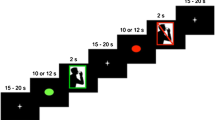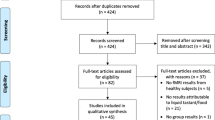Abstract
Functional neuroimaging has shown that multiple brain regions are active during volitional swallowing. Little is known, however, about which regions integrate motor execution and sensory feedback in the swallowing system. Although unilateral brain lesions in either hemisphere can produce swallowing deficits, some functional neuroimaging studies indicate that the left hemisphere has greater activation in certain sensory and motor-related swallowing regions. In this study, correlation coefficients were computed for five seed regions during volitional saliva swallowing to determine the functional relationships of these regions with the rest of the brain: the anterior and posterior insula, inferior frontal gyrus (BA44), primary sensory cortex (S1), and primary motor cortex (M1). A laterality index (LI) was derived that accounts for relative differences in total, positive connected voxels for the left/right hemisphere seeds. Clusters of significantly connected voxels were greater from the anterior and posterior insula than from the other three seed regions. Interactions of the insula with other brain regions were greater on the left than on the right during volitional swallowing. Group means showed laterality in the anterior insula (LI = 0.25) and the posterior insula (LI = 0.33). BA44 showed a lesser degree of difference in left versus right hemisphere interactions (LI = 0.12) while S1 did not show lateralization (LI = 0.02) and M1 showed some predominance of interactions in the right hemisphere (LI = −0.19). The greater connectivity from the left hemisphere insula to brain regions within and across hemispheres suggests that the insula is a primary integrative region for volitional swallowing in humans.




Similar content being viewed by others
References
Alberts MJ, Horner J, Gray L, Brazer SR (1992) Aspiration after stroke: lesion analysis by brain MRI. Dysphagia 7:170–173
Amunts K, Schleicher A, Burgel U, Mohlberg H, Uylings HB, Zilles K (1999) Broca’s region revisited: cytoarchitecture and intersubject variability. J Comp Neurol 412:319–341
Amunts K, Weiss PH, Mohlberg H et al (2004) Analysis of neural mechanisms underlying verbal fluency in cytoarchitectonically defined stereotaxic space—the roles of Brodmann areas 44 and 45. Neuroimage 22:42–56
Bokde AL, Tagamets MA, Friedman RB, Horwitz B (2001) Functional interactions of the inferior frontal cortex during the processing of words and word-like stimuli. Neuron 30:609–617
Brooks JC, Zambreanu L, Godinez A, Craig AD, Tracey I (2005) Somatotopic organisation of the human insula to painful heat studied with high resolution functional imaging. Neuroimage 27:201–209
Car A (1973) Cortical control of swallowing [in French]. J Physiol Paris 66:531–551
Cola MG, Daniels SK, Corey DM, Lemen LC, Romero M, Foundas AL (2010) Relevance of subcortical stroke in dysphagia. Stroke 41:482–486
Cox RW (1996) AFNI: software for analysis and visualization of functional magnetic resonance neuroimages. Comput Biomed Res 29:162–173
Craig AD (2003) Interoception: the sense of the physiological condition of the body. Curr Opin Neurobiol 13:500–505
Daniels SK, Foundas AL (1997) The role of the insular cortex in dysphagia. Dysphagia 12:146–156
Daniels SK, Foundas AL (1999) Lesion localization in acute stroke patients with risk of aspiration. J Neuroimaging 9:91–98
Daniels SK, Foundas AL, Iglesia GC, Sullivan MA (1996) Lesion site in unilateral stroke patients with dysphagia. J Stroke Cerebrovasc Dis 6:30–34
Dziewas R, Soros P, Ishii R et al (2003) Neuroimaging evidence for cortical involvement in the preparation and in the act of swallowing. Neuroimage 20:135–144
Eickhoff SB, Stephan KE, Mohlberg H, Grefkes C, Fink GR, Amunts K, Zilles K (2005) A new SPM toolbox for combining probabilistic cytoarchitectonic maps and functional imaging data. Neuroimage 25:1325–1335
Eickhoff SB, Amunts K, Mohlberg H, Zilles K (2006a) The human parietal operculum. II. Stereotaxic maps and correlation with functional imaging results. Cereb Cortex 16:268–279
Eickhoff SB, Schleicher A, Zilles K, Amunts K (2006b) The human parietal operculum. I. Cytoarchitectonic mapping of subdivisions. Cereb Cortex 16:254–267
Francis S, Rolls ET, Bowtell R et al (1999) The representation of pleasant touch in the brain and its relationship with taste and olfactory areas. NeuroReport 10:453–459
Friston K (1994) Functional and effective connectivity in neuroimaging: a synthesis. Hum Brain Mapp 2:56–78
Gaillard WD, Berl MM, Duke ES et al (2011) fMRI language dominance and FDG-PET hypometabolism. Neurology 76:1322–1329
Gonzalez-Fernandez M, Kleinman JT, Ky PK, Palmer JB, Hillis AE (2008) Supratentorial regions of acute ischemia associated with clinically important swallowing disorders: a pilot study. Stroke 39:3022–3028
Hallett M (2007) Volitional control of movement: the physiology of free will. Clin Neurophysiol 118:1179–1192
Hamdy S, Rothwell JC (1998) Gut feelings about recovery after stroke: the organization and reorganization of human swallowing motor cortex. Trends Neurosci 21:278–282
Hamdy S, Aziz Q, Rothwell JC et al (1996) The cortical topography of human swallowing musculature in health and disease. Nat Med 2:1217–1224
Hamdy S, Aziz Q, Rothwell JC, Crone R, Hughes D, Tallis RC, Thompson DG (1997) Explaining oropharyngeal dysphagia after unilateral hemispheric stroke. Lancet 350:686–692
Hamdy S, Aziz Q, Rothwell JC et al (1998) Recovery of swallowing after dysphagic stroke relates to functional reorganization in the intact motor cortex. Gastroenterology 115:1104–1112
Hamdy S, Mikulis DJ, Crawley A, Xue S, Lau H, Henry S, Diamant NE (1999) Cortical activation during human volitional swallowing: an event-related fMRI study. Am J Physiol 277:G219–G225
Horwitz B (2003) The elusive concept of brain connectivity. Neuroimage 19:466–470
Jean A (2001) Brain stem control of swallowing: neuronal network and cellular mechanisms. Physiol Rev 81:929–969
Jean A, Car A (1979) Inputs to the swallowing medullary neurons from the peripheral afferent fibers and the swallowing cortical area. Brain Res 178:567–572
Kandel ER, Schwartz JH, Jessell TM (2000) Principles of neural science. McGraw-Hill, Health Professions Division, New York
Kern MK, Birn R, Jaradeh S, Jesmanowicz A, Cox R, Hyde J, Shaker R (2001a) Swallow-related cerebral cortical activity maps are not specific to deglutition. Am J Physiol Gastrointest Liver Physiol 280:G531–G538
Kern MK, Jaradeh S, Arndorfer RC, Shaker R (2001b) Cerebral cortical representation of reflexive and volitional swallowing in humans. Am J Physiol Gastrointest Liver Physiol 280:G354–G360
Kleinjan KJ, Logemann JA (2002) Effects of repeated wet and dry swallows in healthy adult females. Dysphagia 17:50–56
Liu H, Stufflebeam SM, Sepulcre J, Hedden T, Buckner RL (2009) Evidence from intrinsic activity that asymmetry of the human brain is controlled by multiple factors. Proc Natl Acad Sci USA 106:20499–20503
Lowell SY, Poletto CJ, Knorr-Chung BR, Reynolds RC, Simonyan K, Ludlow CL (2008) Sensory stimulation activates both motor and sensory components of the swallowing system. Neuroimage 42:285–295
Malandraki GA, Sutton BP, Perlman AL, Karampinos DC, Conway C (2009) Neural activation of swallowing and swallowing-related tasks in healthy young adults: an attempt to separate the components of deglutition. Hum Brain Mapp 30:3209–3226
Marrelec G, Bellec P, Benali H (2006a) Exploring large-scale brain networks in functional MRI. J Physiol Paris 100:171–181
Marrelec G, Krainik A, Duffau H, Pelegrini-Issac M, Lehericy S, Doyon J, Benali H (2006b) Partial correlation for functional brain interactivity investigation in functional MRI. Neuroimage 32:228–237
Martin RE, Goodyear BG, Gati JS, Menon RS (2001a) Cerebral cortical representation of automatic and volitional swallowing in humans. J Neurophysiol 85:938–950
Martin RE, Letsos P, Taves DH, Inculet RI, Johnston H, Preiksaitis HG (2001b) Oropharyngeal dysphagia in esophageal cancer before and after transhiatal esophagectomy. Dysphagia 16:23–31
Martin RE, MacIntosh BJ, Smith RC, Barr AM, Stevens TK, Gati JS, Menon RS (2004) Cerebral areas processing swallowing and tongue movement are overlapping but distinct: a functional magnetic resonance imaging study. J Neurophysiol 92:2428–2443
Martin RE, Barr A, MacIntosh B et al (2007) Cerebral cortical processing of swallowing in older adults. Exp Brain Res 176:12–22
McIntosh AR, Grady CL, Ungerleider LG, Haxby JV, Rapoport SI, Horwitz B (1994) Network analysis of cortical visual pathways mapped with PET. J Neurosci 14:655–666
Meadows JC (1973) Dysphagia in unilateral cerebral lesions. J Neurol Neurosurg Psychiatry 36:853–860
Mesulam MM, Mufson EJ (1984) The insula of Reil in man and monkey: architectonics, connectivity and function. In: Peters A, Jones EG (eds) Cerebral cortex. Plenum Press, New York, pp 179–226
Miller AJ (1986) Neurophysiological basis of swallowing. Dysphagia 1:91–100
Mosier K, Bereznaya I (2001) Parallel cortical networks for volitional control of swallowing in humans. Exp Brain Res 140:280–289
Mosier K, Patel R, Liu WC, Kalnin A, Maldjian J, Baredes S (1999a) Cortical representation of swallowing in normal adults: functional implications. Laryngoscope 109:1417–1423
Mosier KM, Liu WC, Maldjian JA, Shah R, Modi B (1999b) Lateralization of cortical function in swallowing: a functional MR imaging study. AJNR Am J Neuroradiol 20:1520–1526
Niskanen E, Kononen M, Villberg V et al (2012) The effect of fMRI task combinations on determining the hemispheric dominance of language functions. Neuroradiology 54(4):393–405
Pender MP, Ferguson SM (2007) Dysarthria and dysphagia due to the opercular syndrome in multiple sclerosis. Mult Scler 13:817–819
Penfield W, Boldery E (1937) Somatic motor and sensory representation in the cerebral cortex of man as studied by electrical stimulation. Brain 60:389–443
Riecker A, Gastl R, Kuhnlein P, Kassubek J, Prosiegel M (2009) Dysphagia due to unilateral infarction in the vascular territory of the anterior insula. Dysphagia 24:114–118
Robbins J, Levin RL (1988) Swallowing after unilateral stroke of the cerebral cortex: preliminary experience. Dysphagia 3:11–17
Robbins J, Levine RL, Maser A, Rosenbek JC, Kempster GB (1993) Swallowing after unilateral stroke of the cerebral cortex. Arch Phys Med Rehabil 74:1295–1300
Rolls ET (2004) The functions of the orbitofrontal cortex. Brain Cogn 55:11–29
Simonyan K, Ostuni J, Ludlow CL, Horwitz B (2009) Functional but not structural networks of the human laryngeal motor cortex show left hemispheric lateralization during syllable but not breathing production. J Neurosci 29:14912–14923
Soltysik DA, Hyde JS (2006) Strategies for block-design fMRI experiments during task-related motion of structures of the oral cavity. Neuroimage 29:1260–1271
Soros P, Lalone E, Smith R, Stevens T, Theurer J, Menon RS, Martin RE (2008) Functional MRI of oropharyngeal air-pulse stimulation. Neuroscience 153:1300–1308
Sumi T (1969) Some properties of cortically-evoked swallowing and chewing in rabbits. Brain Res 15:107–120
Suzuki M, Asada Y, Ito J, Hayashi K, Inoue H, Kitano H (2003) Activation of cerebellum and basal ganglia on volitional swallowing detected by functional magnetic resonance imaging. Dysphagia 18:71–77
Talairach J, Tournoux P (1988) Co-planar stereotaxic atlas of the human brain. Thieme, New York
Teismann IK, Dziewas R, Steinstraeter O, Pantev C (2009) Time-dependent hemispheric shift of the cortical control of volitional swallowing. Hum Brain Mapp 30:92–100
Watanabe Y, Abe S, Ishikawa T, Yamada Y, Yamane GY (2004) Cortical regulation during the early stage of initiation of voluntary swallowing in humans. Dysphagia 19:100–108
Acknowledgments
We thank Adam Gerson for his assistance on initial methods for this study. This research was supported by the Divisions of Intramural Research of the National Institute of Neurological Disorders and Stroke and of the National Institute on Deafness and Other Communication Disorders.
Author information
Authors and Affiliations
Corresponding author
Rights and permissions
About this article
Cite this article
Lowell, S.Y., Reynolds, R.C., Chen, G. et al. Functional connectivity and laterality of the motor and sensory components in the volitional swallowing network. Exp Brain Res 219, 85–96 (2012). https://doi.org/10.1007/s00221-012-3069-9
Received:
Accepted:
Published:
Issue Date:
DOI: https://doi.org/10.1007/s00221-012-3069-9




